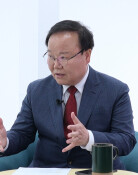Scientists uncover new mechanism to eliminate 'obsolete cell'
Scientists uncover new mechanism to eliminate 'obsolete cell'
Posted September. 08, 2017 07:49,
Updated September. 08, 2017 08:49
It was confirmed that “p62 protein” that was once neglected as a waste inside the cell is in fact helping the damaged proteins breakdown. The recent finding is likely to contribute in curing incurable diseases such as dementia, which is triggered by accumulation of damaged proteins.
On Thursday, the team led by senior researcher Kim Bo-yeon at the Anticancer Compound Research Division under the Korea Research Institute of Bioscience and Biotechnology revealed a mechanism that the obsolete p62 protein can activate the breakdown of proteins. The research team has derived the findings by conducting joint studies along with Professor Kwon Yong-tae of Seoul National University and the University of Pittsburgh.
Diseases such as cancer or degenerative brain diseases are caused by impaired cells located near the aggregated obsolete cells, which are generated due to aging or stress and not eliminated.
In general, protein aggregates are eliminated in two ways. First, protein is killed by “proteasome system," which uses “ubiquitin protein" that clings to only near-death cells. Second, it is the “autophagy” way in which the cell eats away harmful matters or its own impaired cell organelle.
Once it stimulates the breakdown of impaired protein through p62 protein control, the new medicine is expected to help cure senile and metabolic diseases. “To treat metabolic diseases radically, a balanced control of activation is required for proteasome and autophagy," said Kim. "By controlling p62, we have secured an original technology to eliminate ‘Huntington protein aggregation’ which triggers Huntington’s disease." The finding was published online at the “Nature Communication” on July 26.
yskwon@donga.com
Headline News
- Med professors announce intention to leave hospitals starting Thursday
- Bridge honoring Sgt. Moon Jae-sik unveiled in Pennsylvania
- Chief of Staff Chung tells presidential secretaries to stay away from politics
- US FTC bans noncompete agreements
- N. Korea launches cyberattacks on S. Korea's defense companies







